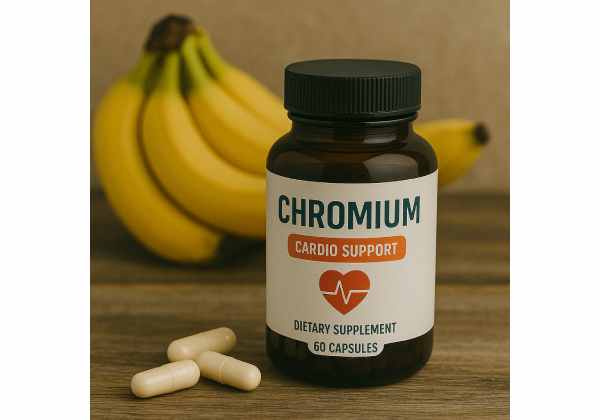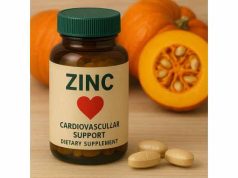
Chromium has increasingly captured the spotlight in the world of dietary supplements due to its potential in supporting heart health and mitigating cardiovascular issues. This trace mineral plays a key role in enhancing insulin function, modulating blood glucose levels, and maintaining healthy lipid profiles. From stabilizing cholesterol balance to promoting vascular support, chromium for cardiovascular health has generated considerable interest among healthcare professionals and researchers alike. Whether you seek to optimize your diet or add a targeted supplement, understanding how chromium benefits heart health could be the missing piece in a broader strategy to protect against many cardiovascular challenges.
Table of Contents
- Fundamental Overview and Distinctive Qualities
- Mechanisms that Drive Chromium’s Benefits
- Documented Heart Health Impacts and Studies
- Practical Guidelines, Administration, and Risks
- Frequently Asked Questions: Key Insights
- References and Sources
Fundamental Overview and Distinctive Qualities
Chromium is a trace mineral naturally present in certain foods, including broccoli, whole grains, and meats. It exists in multiple forms, but the biologically active variant—trivalent chromium (Cr3+)—is the one commonly found in food and supplements. Although you need only small amounts of chromium daily, it performs critical tasks within the body, especially in relation to insulin, glucose metabolism, and cholesterol management.
Evolution of Scientific Interest
Nutritional scientists began paying more attention to chromium in the mid-20th century when studies revealed its crucial role in enhancing insulin sensitivity. Early research used animal models to illustrate how chromium deficiency led to problems with glucose metabolism, and subsequent human trials pointed to its value in supporting healthy blood sugar levels. Given that impaired glucose control is a known risk factor for cardiovascular disease, these findings quickly expanded interest in chromium for cardiovascular health.
Sources and Natural Occurrence
Although chromium can be found in a variety of foods, the mineral content in plants often depends on the soil’s chromium concentration. Generally, the following foods are considered decent sources:
- Broccoli and green beans
- Whole grains like oats and barley
- Lean meats and poultry
- Eggs
- Fruits, including apples and bananas
- Nuts, particularly walnuts and almonds
However, modern diets—which often rely on highly processed foods—may not consistently supply adequate chromium. Practices like milling grains can remove chromium-rich layers, leading to reduced overall intake. Consequently, many individuals find that supplemental chromium is a practical option to help meet daily requirements.
Chromium Forms in Supplements
Common supplemental forms include:
- Chromium Picolinate: A popular form often used in clinical research because of its relatively high bioavailability.
- Chromium Polynicotinate: This variant binds chromium to niacin (vitamin B3), potentially enhancing absorption and synergy in metabolic processes.
- Chromium Chloride: Found in some multivitamins but often considered less bioavailable than other forms.
Each type aims to supply the body with sufficient chromium while minimizing the risk of gastrointestinal discomfort or poor absorption. Individuals interested in chromium for heart health typically gravitate toward picolinate or polynicotinate because of their proven track record in scientific studies.
Interconnectedness with Other Nutrients
Chromium’s function is closely tied to other nutrients, especially those involved in glucose metabolism and heart health. For instance, the presence of adequate amounts of magnesium, zinc, and B vitamins may improve chromium’s efficacy. When combined, these nutrients help maintain balanced insulin activity, healthy blood pressure, and well-functioning lipid metabolism—each a critical factor in preventing cardiovascular conditions.
Why Heart Health?
An ever-growing body of evidence connects metabolic imbalances—like high blood sugar, insulin resistance, and dyslipidemia—to cardiovascular risks. Chromium’s essential role in regulating these aspects highlights its promise for heart health. By potentially moderating high cholesterol, stabilizing blood sugar, and promoting normal insulin function, chromium supports optimal vascular integrity and reduces specific triggers that contribute to coronary artery disease, atherosclerosis, and other cardiac concerns.
Historical Context of Chromium Deficiency
Although overt chromium deficiency is relatively rare, marginal deficiency may be more common than traditionally assumed. Symptoms can range from fatigue and irritability to impaired blood sugar control. Over time, even mild deficiencies may exacerbate metabolic dysfunctions and indirectly heighten cardiovascular risks. This subtlety underscores why health professionals sometimes recommend a balanced diet plus chromium supplementation for individuals with metabolic syndrome, type 2 diabetes, or a family history of cardiovascular disease.
Potential for Athletic and Weight Management Applications
Chromium also attracts attention among those seeking improvements in athletic performance or weight management. Preliminary data suggests that chromium supplementation may help the body utilize carbohydrates more efficiently. Additionally, maintaining healthy insulin function can encourage stable energy levels and reduce the likelihood of mid-day crashes or sugar cravings—factors that can positively influence exercise consistency and weight control. These secondary benefits further align with overall cardiovascular wellness.
Ongoing Developments
As research continues, scientists delve deeper into chromium’s interactions at the cellular level—particularly how it may influence gene expression relating to insulin receptors and cholesterol production. These investigations are likely to yield more insights that reinforce or refine our understanding of how chromium helps cardiovascular function.
In summary, chromium’s distinctive qualities lie in its trace yet transformative influence on metabolic processes. By supporting balanced blood sugar levels, insulin efficiency, and lipid profiles, chromium remains a compelling topic for anyone looking to safeguard their heart health over the long term.
Mechanisms that Drive Chromium’s Benefits
Chromium’s widespread effects on heart health arise from a series of interlinked mechanisms involving glucose regulation, lipid metabolism, and systemic inflammation. Though much remains to be uncovered, existing knowledge underscores the mineral’s multifaceted actions. Understanding these processes sheds light on why chromium for vascular support is increasingly recommended alongside balanced nutrition and lifestyle adjustments.
Enhancing Insulin Sensitivity
At the forefront of chromium’s physiological roles is its ability to enhance the actions of insulin. Insulin is a hormone responsible for facilitating glucose uptake into cells, particularly muscle and liver cells. When insulin sensitivity is poor, glucose accumulates in the bloodstream, leading to prediabetes and eventually type 2 diabetes—both considered significant cardiovascular risk factors.
- Chromodulin Formation: Scientists propose that chromium may help form a low molecular weight protein called chromodulin, which interacts with insulin receptors. This protein amplifies insulin’s signal, resulting in improved glucose uptake.
- Reduced Insulin Resistance: By bolstering insulin function, chromium may offset insulin resistance, a core problem in metabolic syndrome. Lower insulin resistance correlates with better cardiovascular biomarkers, such as reduced inflammatory markers and more stable lipid profiles.
Lipid Profile Management
High LDL cholesterol and triglycerides, coupled with low HDL cholesterol, are well-known contributors to atherosclerosis and coronary heart disease. Research points to chromium’s capacity for helping stabilize or improve lipid parameters, which in turn supports cardiovascular function. Potential ways chromium influences lipid metabolism include:
- Regulation of Enzymes: Chromium might upregulate or modulate certain enzymes that facilitate the breakdown of fats in the liver, contributing to healthier cholesterol levels.
- Decrease in Serum Triglycerides: Some studies have noted a reduction in blood triglycerides among individuals taking chromium supplements, a factor crucial for mitigating cardiovascular complications.
Although results can vary widely depending on the population studied, this potential for lipid regulation anchors chromium’s importance in a heart-health routine.
Blood Pressure and Vascular Tone
Uncontrolled blood pressure is a cardinal risk factor for heart disease. While chromium is not generally classified as a direct antihypertensive, several studies hint that it may indirectly influence blood pressure through better metabolic balance. When glucose levels and insulin sensitivity improve, arterial walls often exhibit enhanced elasticity and reduced inflammation. Chronic hypertension often coexists with insulin resistance, so interventions that address metabolic concerns can produce mild, yet meaningful, improvements in blood pressure regulation.
Inflammatory Modulation
Inflammation underlies many cardiovascular conditions, from plaque formation in arteries to more acute events like myocardial infarctions. Excess blood sugar and insulin resistance contribute to heightened systemic inflammation. By acting on glucose metabolism, chromium may indirectly quell inflammatory processes. A handful of trials suggest that adequate chromium intake correlates with diminished levels of inflammatory markers like C-reactive protein (CRP) and tumor necrosis factor-alpha (TNF-α).
Oxidative Stress Reduction
Elevated blood sugar spikes lead to oxidative stress, which can damage blood vessels. Chromium’s potential role in fostering balanced glucose metabolism may reduce oxidative stress by minimizing abrupt fluctuations in blood sugar. While chromium itself is not typically described as an antioxidant, its capacity to temper hyperglycemia can spare the body from excessive oxidative damage that sets the stage for arterial plaque buildup.
Influence on Body Composition
Carrying excess body fat—especially visceral fat around the abdomen—raises one’s risk for heart disease. Some investigations propose that chromium supplementation can aid modest weight loss or improve body composition when combined with proper diet and exercise. By supporting steady energy utilization and regulating appetite (due to better insulin function), chromium may ease the journey toward maintaining a healthy weight, a key factor for cardiovascular well-being.
Hormonal Interplay
Chromium also interacts with hormones like glucagon and possibly thyroid hormones. Optimal thyroid function helps sustain a healthy metabolism, which in turn supports regulated body weight and stable cholesterol levels. Though these relationships require further exploration, the hormonal interplay adds another dimension to how chromium helps cardiovascular function.
Genetic Variations
Not everyone responds uniformly to chromium supplementation. Genetic differences can influence how well the body absorbs and utilizes this mineral. For example, certain polymorphisms may heighten the mineral’s efficacy, making supplementation particularly beneficial for individuals with a genetic predisposition to insulin resistance or dyslipidemia. Personalized testing might reveal whether someone is among those who stand to gain the most from chromium interventions.
Synergy with Other Nutrients
Finally, chromium typically exhibits improved performance in synergy with other beneficial nutrients. Pairing chromium with B-complex vitamins, magnesium, or alpha-lipoic acid could produce more notable shifts in metabolic health markers. This synergy underscores the principle that supplements work best in a holistic context, supported by a balanced diet and healthy living practices.
Taken together, these mechanisms illustrate how chromium exerts a broad-reaching influence that extends beyond any single facet of metabolism. By modulating insulin action, aiding lipid regulation, and curbing inflammatory processes, chromium emerges as a valuable ally in the quest for lasting cardiovascular health.
Documented Heart Health Impacts and Studies
Scientific inquiry into chromium’s role in cardiovascular health has steadily grown over the decades. Research spans controlled clinical trials, observational studies, and mechanistic experiments in cellular or animal models. While not all findings align perfectly—variations in study design, participant demographics, and chromium dosage can yield differing results—a general picture emerges that positions chromium as beneficial for many facets of heart function.
Improvements in Glucose and Insulin Markers
Chromium’s top claim to fame lies in its interaction with insulin:
- Clinical Trials: Multiple placebo-controlled trials have demonstrated that chromium supplementation, typically as chromium picolinate, leads to improvements in fasting blood glucose levels and HbA1c values in individuals with type 2 diabetes. Since high blood glucose is a precursor to heart complications, these improvements have significant implications for cardiovascular disease prevention.
- Meta-Analysis Evidence: A meta-analysis published in reputable nutrition journals analyzed various studies involving patients with metabolic syndrome. Results often pointed to better insulin sensitivity and glycemic control in those taking chromium supplements compared to placebo groups.
Given that glycemic control is integral to maintaining healthy arterial walls and preventing plaque formation, these findings highlight how chromium benefits for heart health can manifest indirectly through metabolic pathways.
Reduction in Atherogenic Lipid Profiles
Though results can vary, several studies link chromium supplementation with more favorable cholesterol levels:
- LDL and HDL Changes: Certain randomized trials report modest decreases in LDL cholesterol (the “bad” cholesterol) and increases in HDL cholesterol (the “good” cholesterol) following chromium supplementation. The net effect is an improved LDL:HDL ratio, a marker frequently used to evaluate cardiac risk.
- Triglyceride Management: Some studies also record meaningful drops in triglyceride concentrations, another key indicator in heart disease risk. A reduction in triglycerides can diminish the chances of arterial plaque buildup and the subsequent risk of infarction or stroke.
When combined with other lifestyle adjustments, such as reduced intake of saturated fats and regular exercise, chromium’s lipid-management benefits become even more pronounced.
Inflammatory and Oxidative Stress Parameters
Inflammation is a silent killer in the realm of cardiovascular disease. Elevated inflammatory markers often precede arterial plaque formation and contribute to endothelial dysfunction. While the body of research focusing on chromium’s anti-inflammatory effects is not as extensive, preliminary findings are promising:
- HS-CRP Levels: A handful of small trials noted significant declines in high-sensitivity C-reactive protein (HS-CRP) among participants taking chromium picolinate over several weeks to months. Lower HS-CRP levels typically reflect diminished systemic inflammation.
- Antioxidant Defense: Animal studies also suggest that chromium supplementation can enhance key antioxidants such as superoxide dismutase (SOD) within cells, indicating potential for buffering against free radical damage. While not conclusive, these insights lay the groundwork for future human research.
Blood Pressure Observations
Chromium’s relationship with blood pressure is less direct but still noteworthy:
- Population-Based Studies: Some observational research draws associations between chromium status and normal blood pressure ranges, especially in middle-aged adults concerned about prehypertension.
- Clinical Trials: While large-scale, robust trials are limited, smaller studies show trends of mild to moderate blood pressure improvement following chromium supplementation, often in the context of broader metabolic enhancements.
Addressing high blood pressure from multiple angles—diet, exercise, stress management, and possibly chromium supplementation—could yield cumulative benefits for long-term cardiovascular resilience.
Weight and Body Composition
Excess weight significantly burdens the heart and blood vessels. Chromium’s influence on body composition ties back to its role in glucose and insulin regulation:
- Visceral Fat Reduction: Some studies using chromium for cardiovascular health point to modest reductions in visceral adiposity among participants who combined supplementation with a balanced diet and physical activity. This shift can lessen systemic inflammation and reduce the cardiac strain associated with obesity.
- Appetite Control: Anecdotal evidence and smaller-scale studies suggest that chromium might help stabilize appetite by mitigating blood sugar swings. Although more research is needed, this appetite regulation can indirectly support weight management efforts.
User Populations Studied
Much of the existing evidence focuses on individuals with metabolic syndrome, type 2 diabetes, or obesity, as they stand to benefit most from chromium’s insulin-sensitizing properties. However, some studies have examined populations without overt metabolic disorders, observing potential improvements or maintenance of healthy glucose levels and lipid markers. This broad scope implies that chromium’s cardiovascular benefits may extend beyond just those with diagnosed insulin-related conditions.
Study Limitations and Variations
Not every study yields glowing praise for chromium. Some inconsistencies can be attributed to:
- Different Supplemental Forms: Chromium picolinate vs. chromium polynicotinate vs. other variants might produce distinct outcomes.
- Dosage Discrepancies: Studies range from 50 mcg per day to 1,000 mcg or more, which can yield different metabolic effects.
- Population Differences: Age, gender, baseline health status, and genetic factors can affect chromium metabolism and absorption.
Despite these variations, the general consensus in the scientific community is that chromium supplementation, combined with a balanced lifestyle, can support multiple facets of heart health. Ongoing research promises to refine our understanding of optimal dosages, target populations, and best practices for integrating chromium into comprehensive cardiovascular care strategies.
Practical Guidelines, Administration, and Risks
If you are considering chromium for cardiovascular health, understanding how to integrate it effectively into your daily routine is paramount. While chromium is generally recognized as safe, the appropriate dosage, timing, and combination with other nutrients can influence how well it delivers on its potential benefits.
Recommended Intake Levels
There are no universally established RDA (Recommended Dietary Allowances) values for chromium. Instead, Adequate Intakes (AIs) have been suggested:
- Adult Males (19–50 years): ~35 mcg/day
- Adult Females (19–50 years): ~25 mcg/day
- Adult Males (51+ years): ~30 mcg/day
- Adult Females (51+ years): ~20 mcg/day
For those using chromium for therapeutic reasons—like improving insulin sensitivity or addressing dyslipidemia—healthcare professionals sometimes recommend higher doses, typically ranging from 200–1,000 mcg per day, often in the form of chromium picolinate. Always consult a qualified healthcare provider to gauge the right dose for your specific needs, particularly if you have preexisting conditions.
Choosing the Right Form
Chromium supplements vary in bioavailability and tolerance:
- Chromium Picolinate: Commonly studied, well-absorbed, and widely available in capsules or tablets.
- Chromium Polynicotinate: Complexed with niacin, which may enhance metabolic synergy.
- Brewer’s Yeast or Yeast-Based Chromium: Occurs naturally with additional nutrients but may be less standardized in dosage.
Your choice may hinge on factors like supplement availability, personal tolerance, and advice from nutrition experts. People often select chromium picolinate because most research uses this form, resulting in clearer guidelines on safe intake and expected outcomes.
Timing and Administration
- Meals: Taking chromium with meals could enhance absorption, especially if the meal includes some protein.
- Spacing with Medications: If you’re on medications for diabetes or high blood pressure, talk to your healthcare provider about spacing out your chromium doses. Changes in blood sugar or blood pressure regulation might necessitate medication adjustments.
- Divided Doses: Some individuals split their daily chromium dose into two or three smaller servings to maintain more consistent blood levels.
Potential Side Effects
Chromium is widely considered safe when used within recommended guidelines. However, high doses—particularly beyond 1,000 mcg per day—may occasionally lead to:
- Gastrointestinal Distress: Mild nausea, diarrhea, or abdominal pain.
- Headaches: Usually subside as the body adjusts.
- Allergic Reactions: Rare but can occur in those hypersensitive to certain supplement additives.
Individuals with preexisting kidney or liver conditions should exercise caution. Although adverse events are rare, there have been isolated reports linking excessive chromium intake to organ function challenges. Monitoring by a healthcare professional can help mitigate such risks.
Interactions with Medications
Chromium may interact with:
- Antidiabetic Drugs: Sulfonylureas, metformin, or insulin injections. Chromium could potentially amplify their glucose-lowering effects, raising the risk of hypoglycemia.
- NSAIDs: Non-steroidal anti-inflammatory drugs might subtly affect chromium absorption or excretion.
- Thyroid Medications: Although data is limited, ongoing thyroid hormone therapy may be influenced by changes in chromium status.
A pharmacist or physician can offer personalized advice on minimizing interaction risks, especially if you take multiple medications or have complex health conditions.
Ideal Candidates for Chromium Supplementation
- Individuals with Insulin Resistance: Those diagnosed with prediabetes, metabolic syndrome, or type 2 diabetes might see notable benefits in glycemic control.
- Those Concerned About Cholesterol: People aiming to support a healthy lipid profile, in tandem with diet and exercise, may benefit.
- Older Adults: Age-related changes can decrease chromium absorption, making supplementation beneficial for sustaining stable glucose metabolism.
- Athletes or Physically Active Individuals: Chromium’s role in improving insulin sensitivity may help with consistent energy levels, though results vary widely.
Complementary Lifestyle Measures
Relying solely on chromium to maintain heart health overlooks the importance of other pillars:
- Balanced Nutrition: Incorporate lean proteins, whole grains, fruits, and vegetables to ensure a broad spectrum of micronutrients.
- Regular Exercise: Activities like brisk walking, strength training, or cycling enhance insulin sensitivity and lipid metabolism.
- Stress Management: Chronic stress can disrupt hormone balance, undermine insulin function, and elevate blood pressure—compounding heart disease risk factors.
- Routine Checkups: Frequent monitoring of blood sugar, cholesterol, and blood pressure is crucial to catch early signs of metabolic or cardiac issues.
Monitoring and Long-Term Use
As with any supplement, consider periodic checkups to verify the effectiveness of your chromium regimen. Blood tests that measure fasting glucose, HbA1c, and lipid profiles are common ways to gauge improvements in metabolic health. These lab results, combined with how you feel day to day, can help you and your healthcare provider decide whether to adjust your dose or discontinue supplementation.
When incorporated thoughtfully, chromium supplementation can serve as a powerful adjunct to a heart-focused lifestyle. It addresses core metabolic challenges that frequently pave the way for cardiovascular concerns, making it an appealing option for those seeking holistic preventive strategies.
Frequently Asked Questions: Key Insights
How does chromium benefit cardiovascular function?
Chromium enhances insulin sensitivity, which helps regulate blood sugar and may indirectly lower harmful cholesterol and triglyceride levels. This balanced metabolic environment often leads to better heart health by reducing inflammation and improving vascular stability.
Is chromium supplementation safe for everyone?
While chromium is generally safe, individuals with liver or kidney issues and those on medication for diabetes should consult a healthcare provider first. Very high doses may lead to side effects like stomach upset or headache, but these are uncommon when used within recommended guidelines.
Can chromium help control high cholesterol?
Some research suggests that chromium may help lower LDL (bad) cholesterol and increase HDL (good) cholesterol. However, results can vary, and combining chromium with proper diet, exercise, and possibly other medications typically yields the best improvements in lipid profiles.
Does cooking affect the chromium content in foods?
Cooking can cause slight losses of chromium, especially when high heat and water are used. However, most home cooking methods only result in minimal nutrient depletion. Using shorter cooking times and less water may help preserve more of this trace mineral.
How long before I see results in blood sugar or cholesterol tests?
Noticeable changes can vary based on individual metabolism and dosage. Many people experience shifts in blood sugar or lipid profiles within 8 to 12 weeks. Regular checkups and lab tests can help track improvements and determine if dosage adjustments are necessary.
Should I take chromium with other supplements?
Chromium often works well with synergistic nutrients like magnesium, B vitamins, and alpha-lipoic acid. A balanced multivitamin can supply many of these complementary nutrients. Always check with a healthcare provider to ensure compatibility with your current regimen.
Will chromium help me lose weight?
Some studies suggest that chromium may support stable blood sugar levels and curb sugar cravings, which can indirectly aid weight management. However, for meaningful weight loss, pairing chromium with a balanced diet and regular physical activity is crucial.
Is chromium picolinate superior to other forms?
Chromium picolinate is one of the most researched forms due to its good bioavailability. Other forms like chromium polynicotinate can also be effective, but the scientific backing for picolinate is more robust, making it a popular choice.
Do I need a prescription to buy chromium supplements?
Chromium is generally available over-the-counter in various dosages. Nonetheless, individuals with medical conditions or those taking specific medications should seek professional guidance before beginning supplementation.
Can younger people benefit from chromium, or is it just for older adults?
Younger individuals who have metabolic concerns, a family history of heart disease, or blood sugar imbalances may also benefit. Chromium’s potential advantages in stabilizing glucose and maintaining healthy lipid levels apply across different age groups.
References and Sources
- Anderson, R. A. “Chromium, Glucose Intolerance and Diabetes.” Journal of the American College of Nutrition, vol. 17, no. 6, 1998, pp. 548–555.
- Balk, E. M., et al. “Effects of Chromium Picolinate on Glucose Metabolism and Lipids: A Systematic Review of Randomized Controlled Trials.” Diabetes Care, vol. 30, no. 8, 2007, pp. 2154–2163.
- Vincent, J. B. “The Biochemistry of Chromium.” Journal of Nutrition, vol. 130, no. 4, 2000, pp. 715–718.
- Cefalu, W. T., et al. “Chromium in Metabolic Syndrome and Diabetes.” BMJ Open Diabetes Research & Care, vol. 4, 2016, e000150.
- Davies, S., and Howard, J. M. “Chromium Physiology and Polycystic Ovary Syndrome.” Nutrients, vol. 12, no. 11, 2020, p. 3289.
- Hummel, M. C., et al. “Effects of Chromium Supplementation on Cholesterol and Lipoprotein Levels in Humans.” Nutrition Research, vol. 28, no. 10, 2008, pp. 662–668.
- Joffe, Y. T., and Houghton, C. A. “Metabolic Obesity, Adipose Tissue and Chronic Inflammation.” Molecules, vol. 25, no. 23, 2020, p. 6087.
Disclaimer:
This article is for educational purposes only and is not a substitute for professional medical advice. Always consult a qualified healthcare provider before making significant changes to your supplement routine or lifestyle.
Feel free to share this article on Facebook, X (formerly Twitter), or any other social platform, and follow us online for more insights on natural ways to support a healthier heart!










